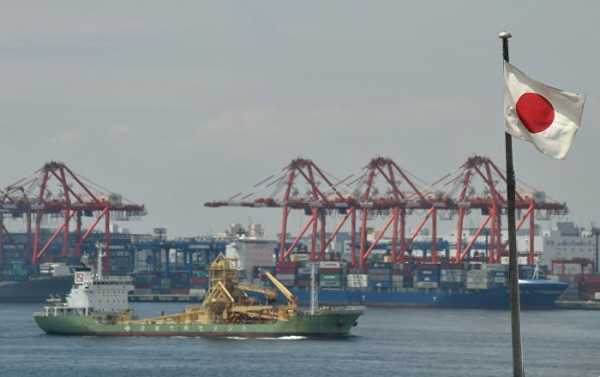
Prime Minister Shinzo Abe, Bank of Japan (BOJ) Governor Haruhiko Kuroda, and top cabinet officials say that the Japanese economy is solid and sustainable, but the mounting international headwinds could affect GDP growth unless decisive action is taken.
Kristian Rouz — Japan’s Prime Minister Shinzo Abe and his top cabinet officials say the island nation’s economy remains on solid footing despite a contraction in the third quarter. Officials expressed confidence that Japan will be able to boost GDP growth next year, not least due to the looming free trade deal with the US, and an expected de-escalation in international trade tensions.
Speaking to one of Japan’s largest business lobbies, Keidanren, on Wednesday, PM Abe said the nation’s macroeconomic fundamentals remain solid, as low unemployment and stable private sector investment continue to support business activity.
Abe said he expects Japan to withstand the turmoil in international trade, which has affected the nation’s foreign trade and GDP growth in the third and — quite likely — fourth quarters of this outgoing year.
Abe also said his cabinet will continue to implement policies aimed at improving labour productivity, with technological advances and innovation driving acceleration in economic expansion next year.
His remarks come after the government reported earlier this month the Japanese economy had contracted by 0.6 percent quarter-on-quarter in 3Q18, while annual GDP growth ground to a halt at 0 percent during that period.
Meanwhile, Abe’s Chief Cabinet Secretary Yoshihide Suga said Japan will soon unveil its goals for the upcoming trade talks with the US.
Suga spoke on Japanese TV on Wednesday and addressed a recent statement from the Trump administration, in which US officials said that they are seeking greater openness in bilateral trade, as well as an elimination of tariffs and regulatory barriers to allow access for American companies to the Japanese market.
In response, Suga said that Japan wants free and fair trade worldwide — mirroring US President Donald Trump’s rhetoric on the matter — and added that the global trading system would likely have to undergo significant changes to achieve that goal.
Suga said international trade could be compromised if different national governments pursue various approaches to trade, especially seeking to take unfair advantage of their trading partners.
“I understand that it’s natural for countries to pursue their own interests, but countries should respect the rules of free and fair trade”, Suga stressed. “Japan’s position is we want to promote these rules for the global economy”.
Suga also noted the Japanese cabinet is closely watching the developments in the Sino-American trade stand-off, as elevated tensions have produced spill-over effects for other nations — including Japan. He said that a dialogue on trade between China and the US could provide valuable clues as to how Japan could assert its position in the upcoming US talks.
Suga also urged China and the US to refrain from imposing new restrictive measures to bilateral trade and said that Japan’s economy could slow down next year — if Sino-American trade talks fall through or produce no results.
For his part, Bank of Japan (BOJ) Governor Haruhiko Kuroda echoed the statements from both Abe and Suga, saying the island nation’s economy itself is strong — but international tensions could affect one of its main sources of growth, which is exports in manufactured goods and technology.
“Japan’s economy is likely to continue expanding moderately. But it’s necessary to bear in mind that uncertainties have recently increased with respect to developments in overseas economies”, Kuroda said on Wednesday.
Kuroda also made his remarks at the Keidanren gathering, alongside PM Abe.
The BOJ governor stressed that the Japanese economy is sustainable enough to endure any possible shocks due to solid corporate profits, household incomes, and consumer confidence — all of which have helped Japanese authorities advance the ongoing structural reform as well.
Kuroda also reaffirmed his commitment to the BOJ’s negative-rate regime, saying the policy will stand in order to support domestic lending and investment activity.
“In complex times like now, what’s required is to persistently continue with the current powerful easing while weighing the benefits and costs of our policy in a balanced manner”, he said.
Overall, Japanese officials expressed modest optimism and confidence in the economy as it enters the New Year with hopes for better trade deals, and decisive reforms at home.
Sourse: sputniknews.com






